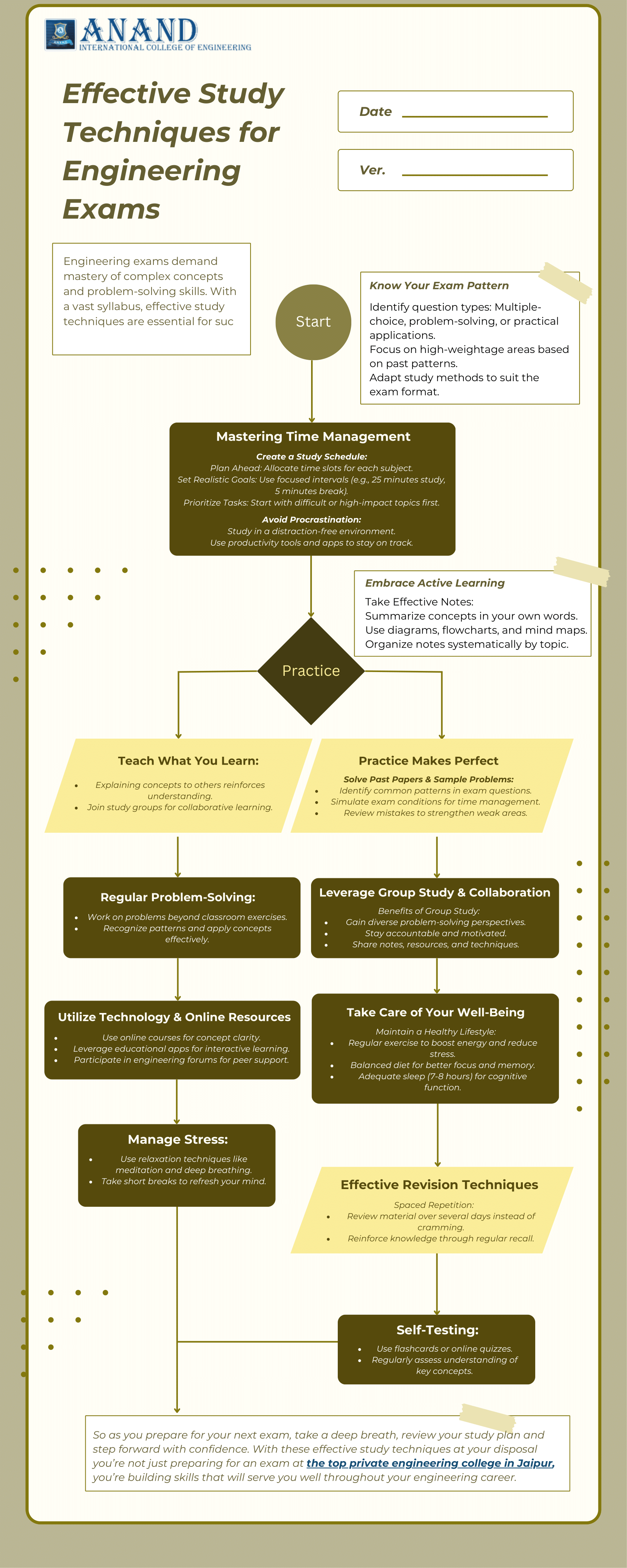Engineering exams at the best private college for engineering in Jaipur can often feel like climbing a mountain as you’re constantly challenged by complex concepts, intricate problem-solving and a vast syllabus to cover. As a student you might sometimes wonder how you can transform those daunting tasks into manageable steps. The good news is that effective study techniques can make all the difference. This guide is designed to provide you with a well-rounded approach to studying that not only boosts your performance but also helps maintain a healthy balance during those intense exam periods.
Understanding the Challenge
Engineering courses are known for their rigor. Whether you’re grappling with circuits, thermodynamics or programming, each subject demands a solid grasp of fundamental principles coupled with the ability to apply them in practical scenarios. The sheer volume of material can feel overwhelming but with the right study techniques you can transform this challenge into a series of achievable tasks.
Know Your Exam Pattern
Before you dive into studying it’s essential to understand the exam format. Different exams might emphasize multiple-choice questions, problem-solving or even practical applications. By knowing what to expect you can tailor your study methods to focus on areas that carry the most weight. For instance if your exams require solving complex problems then you might want to spend more time practicing similar questions.
Mastering Time Management
Time management is the cornerstone of effective studying. Engineering courses typically require you to balance lectures, assignments, lab work and self-study. Here are some strategies to help you manage your time efficiently:
Create a Study Schedule
- Plan Ahead: Dedicate specific time slots for each subject. Use a planner or digital calendar to map out your week.
- Set Realistic Goals: Break your study sessions into focused intervals with short breaks in between. Studying for 25 minutes followed by a 5-minute break can enhance concentration and prevent burnout.
- Prioritize Tasks: Identify which topics need more attention based on difficulty or weightage in your exam. Focus on high impact areas first and gradually work your way through the rest of the material.
Avoid Procrastination
It’s easy to get sidetracked by distractions like social media or even well-intentioned breaks that stretch longer than planned. Keeping distractions at bay by studying in a dedicated and quiet space can help. Remember every minute you spend on focused study is an investment in your future success.
Embrace Active Learning
Passive reading or highlighting alone won’t cut it when preparing for challenging engineering exams. Active learning involves engaging with the material in ways that require you to process and apply the information.
Take Effective Notes
- Summarize Key Points: Write down core concepts in your own words. This not only reinforces your understanding but also creates a handy resource for revision.
- Use Visual Aids: Diagrams, flowcharts and mind maps can help break down complex topics into more digestible pieces.
- Organize Information: Keep your notes neat and categorized by topics or chapters. This makes it easier to locate important details when reviewing.
Teach What You Learn
Explaining a concept to someone else is one of the best ways to solidify your own understanding. Forming study groups where you take turns teaching topics can reveal gaps in your knowledge and strengthen your grasp on the subject.
Practice Makes Perfect
Engineering is all about application. To truly master the material you need to put theory into practice.
Work on Past Papers and Sample Problems
- Identify Patterns: Solving previous exam papers can help you identify recurring question types and topics.
- Simulate Exam Conditions: Try to work through a full-length exam within the allocated time. This will help you manage time pressure and build confidence.
- Review Solutions: Carefully analyze both your correct and incorrect answers. Understanding your mistakes is crucial for improvement.
Regular Problem Solving
Engage with a wide range of problems beyond those given in class. The more you practice the more adept you’ll become at recognizing patterns and applying theoretical concepts to solve practical issues.
Leverage Group Study and Collaboration
Studying in groups can be incredibly beneficial especially when preparing for complex engineering exams.
Benefits of Group Study
- Diverse Perspectives: Different students may have unique approaches to solving problems. Discussing these can broaden your understanding.
- Accountability: Regular group sessions can keep you on track and motivated. When you’re responsible for presenting material or solving problems with peers you’re more likely to stay engaged.
- Resource Sharing: Exchange notes, resources and study techniques. This collaborative approach can expose you to new methods and tools that you might not have considered on your own.
Tips for Effective Group Sessions
- Set Clear Goals: Before each meeting decide on the topics you need to cover. This keeps discussions focused.
- Rotate Leadership: Allow different group members to lead sessions on topics they are most comfortable with. This ensures that everyone contributes and learns.
Utilizing Technology and Online Resources
In today’s digital age a wealth of online resources can supplement your learning.
Online Courses and Tutorials
Online platforms offer detailed explanations of engineering concepts. These resources can provide a different perspective that might help clarify challenging topics.
Educational Apps
Apps and specialized engineering simulation tools can make learning more interactive and engaging. These tools are particularly useful for repetitive practice and self-quizzing which reinforce memory retention.
Forums and Online Communities
Joining online forums such as those on specialized engineering discussion boards allows you to connect with peers, ask questions and share study tips. Engaging with a community can provide moral support and new insights into difficult topics.
Taking Care of Your Well-Being
No study plan is complete without a focus on health. Your physical and mental well-being directly impact your ability to absorb and retain information.
Maintain a Healthy Lifestyle
- Regular Exercise: Even a short walk or light workout can boost your energy levels and reduce stress.
- Balanced Diet: Fuel your brain with nutritious foods. Avoid heavy meals that might make you sluggish during study sessions.
- Adequate Sleep: Aim for 7-8 hours of sleep per night. A well-rested mind is far more capable of handling complex engineering problems.
Manage Stress
Exam periods can be stressful. Incorporate relaxation techniques such as deep breathing, meditation or even listening to calming music. Taking short breaks to clear your mind can often lead to improved focus when you return to your studies.
Effective Revision Techniques
Revision is not just about re-reading your notes, it’s about actively engaging with the material.
Spaced Repetition
Instead of cramming all your revision into one long session spread it out over several days. Spaced repetition is a proven method that enhances long-term retention of information.
Self-Testing
Quizzing yourself regularly on key concepts can help solidify your memory. Create flashcards or use online quiz platforms to test your knowledge. The act of retrieving information from memory is a powerful learning tool.
Concept Mapping
Creating visual maps of related concepts can help you see the bigger picture. These maps not only reinforce individual concepts but also illustrate how they connect which makes it easier to recall information during exams.
Concluding Thoughts
Engineering exams are undoubtedly challenging but with the right strategies you can approach them with confidence. By understanding the exam format, managing your time efficiently, engaging in active learning, practicing regularly and taking care of your well-being you set yourself up for success. Remember that effective studying is not just about working harder but also working smarter.
Each of these techniques requires a bit of experimentation. What works best for one student might not be as effective for another. The key is to try different methods and stick with the ones that suit your learning style. Embrace your journey, celebrate small victories and never hesitate to seek help when needed. Your determination and resilience are your best allies in conquering the demanding yet rewarding world of engineering exams.
So as you prepare for your next exam, take a deep breath, review your study plan and step forward with confidence. With these effective study techniques at your disposal you’re not just preparing for an exam at the top private engineering college in Jaipur, you’re building skills that will serve you well throughout your engineering career.


